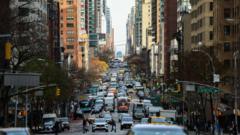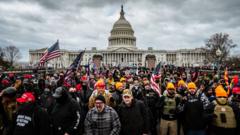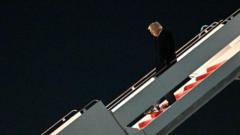In a groundbreaking move, New York City has officially launched its congestion charge scheme, set to take effect this Sunday, making it the first major US city to do so as part of efforts to reduce traffic congestion and bolster the public transport system.
New York City Launches Historic Congestion Charge Scheme

New York City Launches Historic Congestion Charge Scheme
New York City implements the first congestion charge in the US to combat traffic issues and fund public transportation.
New York City has made history by introducing a congestion charge plan aimed at alleviating severe traffic conditions and generating significant funds for the city's public transport network. Effective this Sunday, vehicles entering a designated congestion zone, which spans an area south of Central Park, will incur fees starting from $9 per day, with additional rates for larger vehicles. This initiative encompasses popular landmarks like the Empire State Building, Times Square, and Wall Street, addressing the city’s escalating traffic woes that have plagued residents and commuters alike.
The congestion charge was initially championed two years ago by New York state Governor Kathy Hochul, yet faced delays and backlash primarily from commuters and local businesses. Despite the pushback, the governor reinstated the charge after pausing a similar proposal last June, which she claimed led to "unintended consequences for New Yorkers."
Under the new pricing structure, the daily charge will cost most drivers $9 during peak times and $2.25 during off-peak hours. Small trucks and non-commuter buses will be charged $14.40, while larger trucks and tourist buses will bear a fee of $21.60 during the busiest hours of the day.
Opposition to the scheme has been significant, with taxi drivers' associations leading the charge against it. The most notable opposition has come from former President Donald Trump, a local resident who has vowed to abolish the scheme upon his anticipated return to office. Local Republican leaders have urged him to take action against what they term a "cash grab".
In an added complication, just days before the implementation, a judge rejected an attempt by New Jersey officials to block the charge citing concerns about its environmental effects on neighboring regions.
Remarkably, New York City was ranked as the world's most congested urban area for the second consecutive year by INRIX traffic data, revealing average driving speeds in downtown Manhattan of just 11 mph (17 km/h) during peak morning hours in early 2023. As this unprecedented congestion charge scheme rolls out, it aims to bring both relief to the streets of New York and a much-needed funding boost to its transportation infrastructure.





















